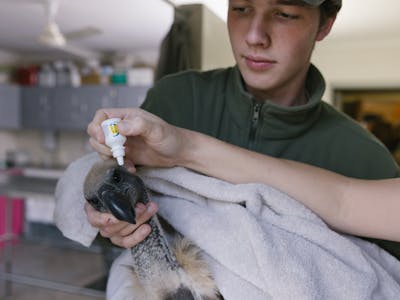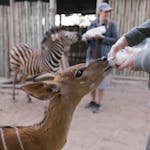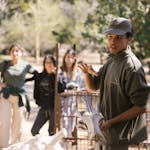Make it yours
Every experience is customised to be just right for you.
WILDLIFE VOLUNTEERING: THE RED FLAGS MOST PEOPLE MISS
Learn more
This unique field trip gives aspiring vets and vet nurses the chance to step out of the practice clinic and into the heart of African wildlife medicine. From darting and diagnosing to recovery and release, students will gain exposure to rare species, diseases, techniques and drugs that set them apart.
Working in small teams, students will enjoy maximum access to the experienced vets they’re shadowing. This provides more chances to ask questions, observe every stage of the process, and develop skills and confidence with each new case.
From supporting anti-poaching teams to assisting in the care, rehabilitation and release of injured and rescued wildlife, they’ll gain first-hand insights into the full impact of wildlife veterinary work in Africa Along the way, they’ll also learn about the strict welfare guidelines for conducting veterinary procedures on African wildlife - and will only participate in procedures that are necessary for the conservation and welfare of their patients.
Beyond their own clinical and field experience, veterinary students will make a valuable contribution to the long-term conservation of Africa’s endangered species.



From rhinos and lions to giraffes and buffalo, students will have the chance to work on and learn about cases involving species, diseases and treatments that are unique to Africa.
Students will develop real-world knowledge that can be applied to their studies, including sterilisation, diagnosis, cutting, stitching, drawing blood, as well as learning how to immobilise large animals and test for diseases.
Alongside practical learning, students will also receive lectures in the field on subjects such as the anatomy and physiology of Africa’s wildlife, sedatives used by vets in Africa, and diseases that are unique to the region.
As well as veterinary work, students can go on game drives in the world-renowned Kruger National Park, giving them a broader understanding of animal welfare and wildlife management, while seeing animals like elephants in one of their last population strongholds.
Vets are the first line of defence in key conservation issues like maintaining genetic diversity and disease management. Students will assist with clinical procedures that support the long-term survival of iconic species.
Students will only work on real cases that are in the animal’s best interests. Procedures like rhino horn trimming are carried out periodically but the vets don’t perform these solely for training purposes as there can be negative impacts on the animals if repeated too frequently.
An essential tool for tranquilising large animals in the field, students will learn to aim and shoot a dart gun with skill. After getting to grips with darting on the ground, they’ll be taken up in a helicopter to shoot a human-made practice target from the air.
This is a suggested itinerary. Every field trip can be customised to be just right for you and your group.

Welcome to a specialist wildlife sanctuary that saves lions from cub cuddling experiences, the lion bone trade and canned lion hunting. Staying on-site at the centre, students will assist the team that saves lions living in the worst circumstances and provides a lifetime of care in a high-welfare environment.

Students will get to observe or assist the vet with a variety of work with rescued lions. From immobilising and transporting lionesses for contraceptive surgery to prevent further breeding in captivity, to supporting aftercare following these procedures and performing health checks on recently rescued lions, they will get deep insight into the physiology and conservation challenges of this iconic African species.

Students will get to observe or assist an experienced vet carrying out specialist procedures on sedated rhinos in support of anti-poaching efforts. Depending on the vet’s case load during your field trip, this could be humane rhino horn trimming, tagging, ear notching or fitting tracking collars.

Students will receive expert training in handling a dart gun and shooting at non-live targets, both on the ground and from a helicopter. This is a vital skill for wildlife vets working with large animals that need to be immobilised from distance. Students will also get to observe the darting of live patients and may get to assist with monitoring vital signs while the animal is sedated

Shadowing an expert vet on their day-to-day work, students will learn about the practical realities of working on African wildlife in the field. Whether they’re observing disease testing and preventing in buffalo, providing assistance during treatment of injuries and diseases, or helping with the relocation of giraffe, they’ll be completely immersed in the world of African veterinary practice.

Exploring the Kruger National Park in 4x4 vehicles with expert guides, students will have an incredible opportunity to see Africa’s iconic species in their natural habitat. These game drives offer students the chance to deepen their understanding of species-specific ecology and explore the national park’s rich biodiversity.

Welcome to one of Africa’s largest wildlife sanctuaries - and your group’s home for the remainder of your field trip. Moholoholo rescues, rehabilitates and releases a wide range of injured species - and provides lifelong care for those that cannot go back to the wild. Living in the centre itself, students will fall asleep to the sounds of lions roaring and hyenas whooping! This immersive experience creates a deeper connection with the residents (both animal and human) living in this world-renowned centre.

Students will get involved in all aspects of wildlife care and rehabilitation. They’ll gain first-hand experience preparing nutritionally balanced diets, providing hands-on assistance with feeding, enriching animals’ lives by creating a natural setting in captivity, as well as the daily cleaning and mucking out of animal enclosures.

Throughout this field trip, students will engage in talks and debates about important conservation topics. From the bird of prey crisis and the vital role animal care plays in wildlife conservation to the history of Moholoholo and the reason different species end up being rescued and requiring care and rehabilitation.
Understand the procedures and drugs vets use to successfully conduct work in support of anti-poaching and wildlife management. Students will also learn about the challenges of treating animals in the wild and the importance of maintaining genetic diversity in wildlife populations.
Understand the role of wildlife vets in maintaining high standards of animal welfare in sanctuaries and rehabilitation centres and the conservation value of these centres.
Learn about the vet’s role in wildlife management and conservation, from wildlife capture and relocation to pregnancy testing in breeding programmes.
Learn about common diseases affecting African wildlife, the tests conducted to diagnose infection, and how to carry out blood testing on wildlife. Along the way, students will gain a deeper knowledge of veterinary pharmaceuticals, dosages and effects - as well as the physiology, anatomy and diets of African animals’ diets.
Learn to successfully operate a dart gun used by wildlife vets to sedate large game. Training sessions involve human-made targets and the opportunity to practice from both a moving vehicle and a helicopter.
Gain a deeper understanding of habitat loss, poaching and the illegal wildlife trade, the decline of endangered species, and other globally significant conservation challenges.
Related field trips
Explore programs similar to this one.
Gain experience working in an animal care centre and supporting conservation field work
View details for Kruger Animal Care & Conservation TripGive your students a broad taste of life working in African wildlife conservation projects
View details for Biology & Ecology Kruger Fieldwork TripChallenge your students by joining internationally relevant conservation projects
View details for Global Citizens CAS Field TripWork hands-on to support conservation projects alongside local communities
View details for Changemakers Service Learning Trip